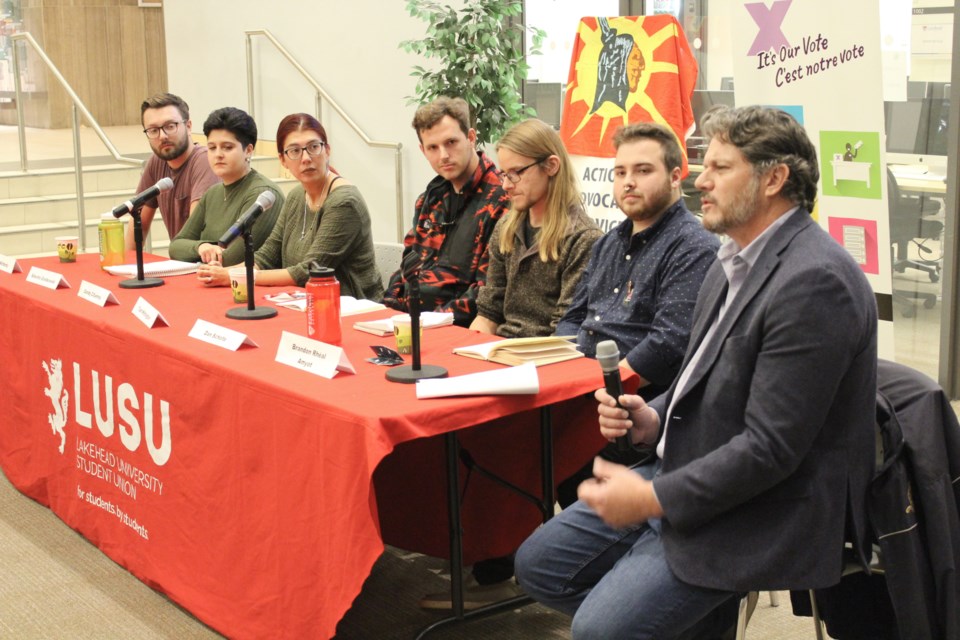Lakehead University students turned the all-candidates meeting format on its head Tuesday evening.
The university’s department of political science and its student union hosted an event at the Orillia campus called What Would Get You to Vote?
Five of Simcoe North’s six federal election candidates were in attendance — Angelique Belcourt (NDP), Gerry Hawes (Liberal), Stephen Makk (People’s Party of Canada), Valerie Powell (Green) and Bruce Stanton (Conservative) — but they were in the audience. They were there to listen.
The panel was made up of six Lakehead students: Brandon Rhéal Amyot, Sandy Cifuentes, Aleesha Gostkowski, Evan McHardy, Dan Scholte and Tosh Withington.
The students fielded questions from moderator Todd Stubbs, a Lakehead professor. He first asked the students what issues should be prioritized for this election and how to do so in a way that engages younger voters.
Free tuition would be a good start, said Cifuentes.
“If it were free, I think that would be exceptional,” she said, adding it would encourage more people to pursue post-secondary education.
That was echoed by Withington, who would “love to see institutionalized kindness over competition.”
Scholte said climate change should be a priority.
“It seems like such a pressing issue that I feel daily stress about,” he said.
It’s frustrating to hear people from older generations take it lightly, Scholte said, adding he has often been asked why he’s panicking about it.
“What do you mean?” he replies. “We need to be panicking.”
When asked what local candidates could do about those issues, Gostkowski had a list of ideas; the City of Barrie has declared a climate emergency, she noted, suggesting that could be done in other municipalities.
She also would like to see cities “electrify” public transportation.
McHardy had the opioid crisis on his mind and said safe-injection sites would be a helpful addition to the area.
“People need to look at this much more closely because young people are dying,” he said.
Like Gostkowski, Amyot wanted climate change to be top of mind.
They lamented that the part of Monday’s federal leaders debate in which the discussion about Indigenous issues and climate “devolved” into a debate about pipelines.
“When it comes to climate change, listen to what Indigenous communities have been saying for decades,” Amyot said.
Stubbs asked the students for ideas to engage young voters.
Getting with the times would be a good start, McHardy said.
“It seems that we have old means of voting,” he said, though he was not calling for an end to paper ballots. “We live in an age where you should probably be able to vote via an app.”
Withington suggested a stronger focus on “civic literacy” in high schools and elementary schools would help engage youth.
Lowering the voting age would help, too, said Scholte. Some people might feel those younger than 18 aren’t knowledgeable enough to make an informed choice, but Scholte pointed to 16-year-old climate activist Greta Thunberg as proof that they can be.
“She has a better grasp on the climate change issue than most of our politicians globally,” he said.
Electoral reform is another way to make disenfranchised citizens feel more involved, Amyot said, noting a Parliament with a more proportional system would mean “you’re going to have to work together.”
While the candidates were, essentially, spectators at the event, they did get a few minutes to address the panel and the audience at the end.
Stanton, the incumbent in Simcoe North, said he had watched the work of the all-party committee that looked into electoral reform — “some of the best committee work that Parliament did in the past term.”
Then, he made an admission that prompted Powell to say she hoped it had been recorded.
“I’m a convert to looking at … how some kind of hybrid system will serve the voters better,” Stanton said, adding he expects to see some sort of electoral reform in his lifetime.
Powell told the panel members their priorities and positions aligned “very well to the Green Party policies and what we want to do,” including electoral reform, climate action and lowering the voting age.
Belcourt also agreed with many of the points made by the students.
“Your realities and your stories are true and they’re valid and real,” she said.
As an Indigenous person, she said, it’s her duty to look out for not only the land but also the people on it.
The sense of urgency demonstrated by the panel members isn’t exclusive to young people and students, Makk said.
“The scary thing is we’re not hearing this just from young people. I hear similar concerns from retirees who are scared about their future,” he said.
He told them he is in favour of electoral reform.
“If that’s what the people want, that’s what we want to do,” he said.
Makk then repeated a line he has used throughout the campaign, urging students to take individual and collective action instead of waiting for the government to make change.
“Start to think about solutions that aren’t just the government because we don’t have the magic wand.”
Hawes had the last word among the candidates, and he used some of his time to say he understood “marginalization,” being an openly gay man whose spouse of 30 years is Indigenous.
He said the students’ message seemed to indicate a “need for transformative thinking,” and he felt his experience as a policy adviser with the province would be an asset in that regard.
Hawes is also in favour of lowering the voting age to 16 and of moving to a ranked-ballot system of electing MPs.
“The playbook, in some situations, has to be thrown out,” he said.
